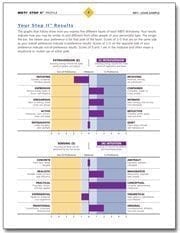MBTI® Test ESFP Personality Types and Leadership
Your particular Myers-Briggs® test personality type benefits from your natural propensity for using your mind in different ways than others. Employing some of the most elementary patterns in human operation, the MBTI test helps in numerous areas of life, and most certainly with occupational growth and examination. Knowing the diverse qualities that you demonstrate is crucial when contemplating successful leadership. They provide comprehension of your core attributes. This week we will be learning about how to involve and motivate others to achieve your establishment’s goals by concentrating on your unique aptitudes as an Extroverted Sensing with Introverted Feeling (ESFP) MBTI type. (Richmond, 2008, CPP Inc.)
Clik here to view.

Image courtesy of Vichaya Kiatying-Angsulee at FreeDigitalPhotos.net
Sharon Richmond states that “your development as a leader parallels the development of your personality type”. That being said, you can plainly see that moving forward as a leader, you should focus on every aspect of your personality type. For example, you can embrace Richmond’s concept by grasping hold of your strengths as ESFP’s by being “quick to adapt to what you see as right for each unique situation”: you are “masters of improvisation, at ease even in the most unexpected situations” and tend to “attend first to pragmatic issues, often starting with people’s practical needs”. (Richmond, 2008, CPP Inc.)
ESFP leaders tend to prosper by generating choices that will assist individuals; favoring choices that resonate with their own morals. They seek up-front, concrete resolutions while simultaneously working instinctively in fast-paced, active environments. ESFP’s use their approachable, outgoing panache and positive viewpoint to generate rapport and inspire others. They pursue and value contributions from others and use this input to reach agreement. In addition, they have a habit of creating long-term relations that can contribute to their own progression. MBTI test ESFP’s rally the achievement of objectives by knowing how to duplicate prior accomplishments by identifying and reiterating a fruitful procedure, motivating others to take action and, by being pro-active and spontaneous, enjoying leading others to success. They then reward and celebrate the completion of landmark achievements to help keep the team motivated. (Richmond, 2008, CPP Inc.)
In addition to the strengths that ESFP’s possess, they also face many challenges that must be overcome in the process of becoming successful leaders that others will follow. ESFP leaders tend to put too much emphasis too rapidly on practical solutions, occasionally overlooking the underlying causes. They can feel great uneasiness with contradictory viewpoints, making it challenging to choose a course that may displease others. ESFP’s have a fun-loving style that isn’t always effective with everyone, creating a gap with more serious individuals that must be bridged. Myers-Briggs ESFP types can also be seen sometimes as playing favorites when evaluating performance and providing opportunities to others. All of these challenges can be overcome with hard work and dedication. (Richmond, 2008, CPP Inc.)
It is important that you understand that leadership needs to be fun with a willingness to be responsible for consequences. Responsibility can help you put more thought into decisions instead of acting on impulse. By focusing on this, as an MBTI test ESFP type, you can truly succeed as a leader amongst leaders. (Richmond, 2008, CPP Inc.)
-
MBTI® Step II™ Profile
$55.00 Add to cartFurther investigate the intricacies of your personality with this detailed report of your MBTI® type and its features.
The MBTI® Step II™ Profile further dissects your MBTI® type, providing you with more in-depth information on your personality and preferences. Four pages of detailed graphs show why you received the Myers-Briggs® test four-letter type that you did (given at the beginning of the profile), and what it is about yourself that makes you that type (five detailed subcategories, or facets, for each letter). The information gained from the MBTI Step II Profile can be beneficial to your work life, your relationships, your home life, and your schooling.
Learn More About the MBTI ESFP Personality Type
References:
Introduction to Type and Leadership (Sharon Lebovitz Richmond, 2008 CPP Inc.)
Introduction to Type (Isabel Briggs Myers, 1998, CPP Inc.)
